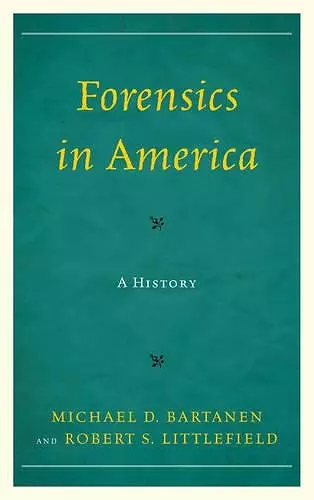Forensics in America
A History
Robert Littlefield author Michael Bartanen author
Format:Hardback
Publisher:Bloomsbury Publishing PLC
Published:7th Nov '13
Currently unavailable, and unfortunately no date known when it will be back

Here is the story of the process by which competitive speech and debate evolved in the United States during the 20th Century.
This authoritative history shows how forensics, as practiced in the United States, was an uneasy fusion of contradictory premises that began as a significant part of the tradition of American public address: The need for preparing students to participate in democratic governance in conflict with a student’s need to express personal and competitive impulses. Forensics represented a push and pull between an activity simultaneously considered to be both a public and a private good.
The book:
identifies the themes and trends of American forensics within an overarching chronological framework; reveals the impact of American forensics on the communication discipline, as well as America’s social and educational systems; concentrates on the elements of social history that contributed to organizational development, leadership, and politics; and, provides a base line reflecting the influences of both American culture in particular, and western culture in general, for cross-cultural comparisons between processes and effects of forensics as a form of education.
While intrinsically valuable as part of a comprehensive understanding of the history of higher education in the United States in the 20th Century, Forensics in America: A History is significant in providing a context for understanding the role forensics may play in the 21st Century. The book expands the study of American public address, focuses on the pedagogy of forensics training, and explores cultural dimensions of forensics activities.
Through an examination of written histories and other materials, communication scholars Michael Bartanen and Robert Littlefield deliver the first historical account of the evolution of forensics in the US. The authors identify the systemic variables affecting this evolution, including the cultural dimensions of forensics activities. In part 1, they trace the historical context of the practice of forensics from the era of public oratory through the era of technology. In part 2, they address the pedagogical growth and development of competitive forensics. And in the third and last part, they focus on the sociocultural dimensions of the field. In a particularly compelling chapter, the authors discuss "absent histories" and offer a holistic understanding of African American participation in forensics in the US. The helpful tables the authors provide allow readers to more easily comprehend dense and complicated material. As the first work to trace how forensics undergirds the tradition of American public address, this book is an invaluable resource. Summing Up: Highly recommended. Lower-division undergraduates through faculty and professionals. * Choice Reviews *
Forensics in America should be in every department library, on every professor’s bookshelf, and in every student competitor's backpack. -- James Copeland, Executive Director-Emeritus, National Forensic League
The authors are the experts in the field. They develop a coherent and important argument. This is the first comprehensive history of American forensics and I predict it will stand as the history of forensics for the next 100 years. -- David A. Frank, University of Oregon
Forensics in America: A History does an excellent job of starting at the formation of forensics and describes its growth and role in America. It also explains the link between forensics and the formation of communication departments and forensic organizations. -- Gina Jensen, Assistant Director of Forensics and Debate, Webster University
The history is vital to the activity, but much of what is known, especially what is known to younger coaches/directors is myth - passed on because one person five years ago did something. This history clears up many of the myths. The major strength of this book includes the research and the explanations. Forensics in America is very clear and follows a logical progression. If you are interested in learning about the history of forensic activity, or teaching it, this book is a necessary component. -- Nina-Jo Moore, Professor of Communication, Appalachian State University
ISBN: 9781442226203
Dimensions: 236mm x 159mm x 28mm
Weight: 626g
334 pages